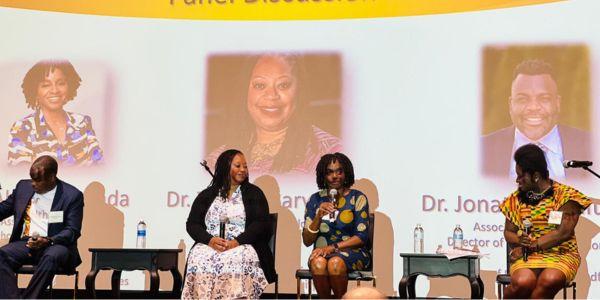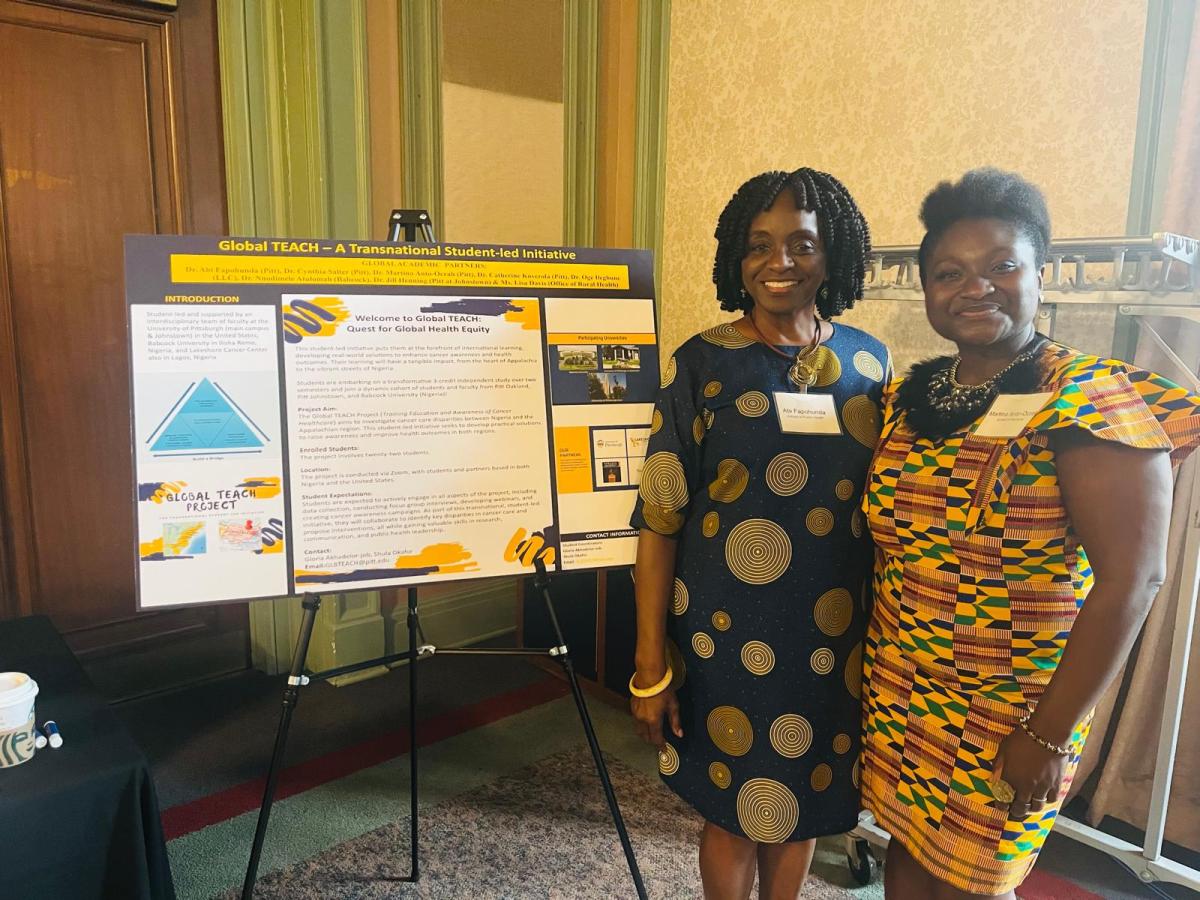
Dr. Abi Fapohunda is an instructor in the Department of Africana Studies as well as a trained epidemiologist and health educator with a focus on research in health equity, health in the African diaspora, and effectiveness of community-based public health initiatives. Dr. Fapohunda is affiliated with the Center for African Studies and the Global Studies Center. Over the next two years, aided by the GAP fellowship, Dr. Fapohunda will partner with faculty at the University of Pittsburgh, the University of Pittsburgh at Johnstown, and Babcock University in Lagos, Nigeria in order to collect and share information regarding breast and cervical cancer awareness in underserved communities. Public health students, supported by this interdisciplinary group of faculty, will work to create a bridge between two specific communities of women: “hard-to-reach" women in Appalachia and the “invisible” women in Lagos, Nigeria. Dr. Fapohunda’s work will facilitate global partnership and additionally, help Pitt build a sustainable relationship with the Lakeshore Cancer Center in Lagos.
I migrated with my family from London, England in 1990 to Indiana, PA where I completed a Master of Science in Food & Nutrition. Job opportunities and a desire for higher education brought me to Pitt in the fall of 1994 when I enrolled in the Graduate School of Public Health’s DrPH program in Epidemiology. After graduating in 1999, I founded FOB Group LLC, a women-owned public health consulting business. In 2007, I began teaching as an adjunct faculty member in the Department of Africana Studies at Pitt, and in 2021, I became an adjunct at the School of Public Health. Eventually, in 2023, I was hired as an Assistant Professor in the Department of Behavioral & Community Health Sciences. I also serve as Director of the Accelerated Bachelor’s /Master’s Program, at the School of Public Health.
 A typical day starts with a walk in Monroeville Park. Because of the 5 or 6-hour time difference between the U.S. and Nigeria, while walking, I usually read and respond to messages related to the "Learn with the Lakeshore" eLearning project and the Global TEACH project—a transnational student-led project with participants from the U.S. and Nigeria universities — that I coordinate. When I return home, I will have breakfast, check my schedule for the day, respond to emails, and get ready for meetings. In between meetings, I communicate with the training coordinator for the “Learn with Lakeshore” eLearning project based in Nigeria and the student coordinators for the Global TEACH project based in the U.S. After the meetings, I will get ready for my classes. After class, I usually spend some time meeting with and responding to students’ queries. My day usually ends late after catching up with other departmental administrative work.
A typical day starts with a walk in Monroeville Park. Because of the 5 or 6-hour time difference between the U.S. and Nigeria, while walking, I usually read and respond to messages related to the "Learn with the Lakeshore" eLearning project and the Global TEACH project—a transnational student-led project with participants from the U.S. and Nigeria universities — that I coordinate. When I return home, I will have breakfast, check my schedule for the day, respond to emails, and get ready for meetings. In between meetings, I communicate with the training coordinator for the “Learn with Lakeshore” eLearning project based in Nigeria and the student coordinators for the Global TEACH project based in the U.S. After the meetings, I will get ready for my classes. After class, I usually spend some time meeting with and responding to students’ queries. My day usually ends late after catching up with other departmental administrative work.
Making a Lasting Impact
My proudest accomplishment at Pitt is the documented positive impact the classes I have taught have had on the students who took one or more of my classes during the past 17 years. Some of them have called, sent email messages, or posted on social media that taking one or more of my classes influenced their decision to pursue graduate degrees in public health. For me, that is as rewarding as it is refreshing to know that I am helping to prepare the next generation of public health practitioners.
Empowering Global Change
The most exciting project I am currently working on is the Global TEACH project, a student-led transnational initiative. Through the project, students are learning about the state of cancer care in Nigeria and Appalachia and will be required to develop a cancer awareness campaign. I received the Global Academic Partnership (GAP) 2023/2024 Award, funded by the Pitt Global Studies Center, to support the development and implementation of the Global TEACH Project, an academic partnership between the School of Medicine, the School of Public Health, the Center for African Studies, Pennsylvania Office of Rural Health, and Lakeshore Cancer Center in Nigeria, with 22 participating students from Pitt's main campus, Pitt-Johnstown, and Babcock University in Nigeria. The project has been exciting for all of us. We are currently in the implementation phase of the Global TEACH project. Participating students will gain cross-cultural experience, enhance their skills in webinar presentations, conduct focus group interviews, and design a cancer care awareness campaign. Through the program, I hope to build a strong and lasting relationship with our partners. We have started to see some benefits. Eight Babcock University public health students completed a 12-week summer internship at Lakeshore Cancer Center.
Supporting Global Healthcare
 The University Center for International Studies (UCIS) has supported my work abroad through various summer travel grants since 2017. A pilot project that I completed before the development and implementation of the “Learn with Lakeshore” initiative, through, which Nigerian healthcare practitioners were trained, was funded by the Center for African Studies and UCIS Hewlett Fund, and the Global TEACH Project is funded by the Global Academic Partnership (GAP Award) through the Global Studies Center. With funding from UCIS trans-national collaboration has occurred and many lives have been changed through knowledge transfer and cancer awareness training. I look forward to more transnational collaborative projects.
The University Center for International Studies (UCIS) has supported my work abroad through various summer travel grants since 2017. A pilot project that I completed before the development and implementation of the “Learn with Lakeshore” initiative, through, which Nigerian healthcare practitioners were trained, was funded by the Center for African Studies and UCIS Hewlett Fund, and the Global TEACH Project is funded by the Global Academic Partnership (GAP Award) through the Global Studies Center. With funding from UCIS trans-national collaboration has occurred and many lives have been changed through knowledge transfer and cancer awareness training. I look forward to more transnational collaborative projects.

